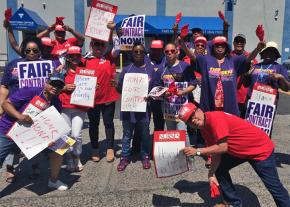When caregivers go on strike
reports from New York City on a one-day walkout by union nurses.
NURSES AND caregivers from the New York State Nurses Association (NYSNA) and 1199SEIU (Service Employees International Union) went on a one-day strike across New York City to protest the for-profit health care company Fresenius.
Workers struck outside of working class and multiracial neighborhoods in Brooklyn, Bronx and Upper Manhattan to ensure optimal patient care, pension benefits and collective bargaining.
The one-day walkout is part of a several-years-old battle to negotiate a contract, but also an international challenge against this highly profitable company.
Fresenius manages dialysis centers in New York City, as well as in Britain, Spain and Germany as well. Workers went on strike as part of a local and international effort to challenge layoffs and pension cuts.
Fresenius has used anti-union tactics in its international expansion. In Brooklyn, it built a new nonunion facility on Degraw Street that is walking distance from its unionized dialysis center. The company is attempting to move all staff into that building, while keeping administration so the facility with union representation would have no union members.

At stake is an opportunity to win a five-year contract with better benefits and higher staff-to-patient ratios. Niro, a retired worker in Brooklyn, said of Fresenius: "They're crooked. they're crooked, that's it. They don't care about workers."
SINCE ITS initial founding in 1912, Fresenius has expanded its health operations outside of Germany. Most recently, Fresenius Helios purchased IDC Salud Holding S.L.U., Spain's largest hospital operator, for $6.5 billion. This gives Fresenius 43 hospitals, 39 outpatient centers and 300 prevention centers.
While the company celebrated this deal, the transaction undermines affordable and public-sector health facilities that are already in place. At a moment when Spain, among other European countries, is facing drastic austerity measures because of the long-running debt crisis, these health care buyouts are another way to impose higher costs on patients and local facilities.
Meanwhile, the German-based Fresenius is accused of skimming resources and decreasing support staff at facilitis it acquired. The company faced controversy earlier in the decade when it implicated in distributing faulty insulin devices to British health facilities.
In New York City, Fresenius is trying to cut staff so that the patient-to-nurse ratio would reach 12 to 1, up from the current 10 to 1. The union is demanding a 6 to 1 ratio.
Fresenius' neoliberal health policies come amid a continuing attack on workers and their organizations in Europe and North America, though there have been signs of a fightback, such as the 40,000-strong weekend strike at AT&T last month.
The NYSNA's June 12 strike had a different character because of the international component. Union members and officials traveled to Germany to with nurses and hospital workers from the Ver.di union.
One of the delegates, nurse Teresa Schloth, noted that Fresenius was promoting the for-profit system there, but German health care workers have been able to take on the company because of a stronger union and work council culture. In addition, German labor laws have made it more difficult to undermine working conditions.
Another component that contributes the to greater strength of German workers is the existence of a universal health care system. The basic right to health care--something missing entirely in the U.S. context--gives workers and patients to unite and fight from a higher ground.
Sentiment for a single-payer system in the U.S. is greater than ever, as seen by the legislative successes of "Medicare for all" initiatives in New York and California, though these bills have more hurdles to overcome before becoming law. Campaigns to win these measures can be coordinated with solidarity for the struggles of health care workers.
The June 12 strike shows the strength of workers who provide the necessary care and expertise to patients. They work long hours to help those with long-term chronic diseases or temporary disability.
Sharice, a tech worker for 18 years, had never been on strike before, but in answering the question of what it would take to win, she said: "We have to take another step. Without us, you don't have patients. They don't even like that we're in a union."


